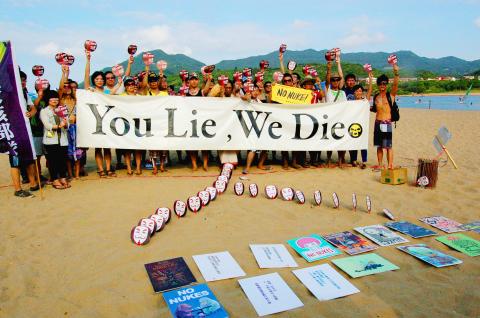With the assistance of lawyers and civic groups, several residents from New Taipei City’s (新北市) Jinshan (金山) and Wanli (萬里) districts on Friday filed an administrative appeal with the Executive Yuan, asking it to rescind the Atomic Energy Council’s (AEC) authorization last month to reactivate the Guosheng Nuclear Power Plant’s No. 1 reactor.
Environmental Jurists Association secretary-general Echo Lin (林仁惠) said 25 people, including local residents and representatives of civic groups, who all live within 30km to 40km of the nuclear plant, collectively filed the administrative appeal asking the operation at the plant to be halted.
Tsai Ya-ying (蔡雅瀅), an attorney affiliated with Wild at Heart, said the first reactor at the plant in Wanli, New Taipei City, which was built in 1973 and began operating in 1981, has been running for more than thirty years, so it is not only very old, but there have been several incidents that raised safety concerns.

Photo: Tseng Hung-ju, Taipei Times
According to a report by the AEC in June last year, the emergency circulating cooling water system is located in the basement of the plant, below the possible maximum altitude of a tsunami, Tsai said, adding that cracks were found in anchor bolts and the core shroud during a routine maintenance check in March this year.
Tsai said there are procedural defects in the AEC’s decision to allow the reactor to restart, including not holding a public hearing on the issue as stipulated in the Administrative Procedure Act (行政程序法).
It also violated conflict of interest rules by having two members of the Institute of Nuclear Energy Research, which has contracts with Taiwan Power Co, on the committee in charge of evaluating the restart, she added.
“Japan’s Fukushima Dai-ichi nuclear crisis was later found to be a preventable disaster with several crucial defects that already existed [before it was hit by a tsunami],” said Wu Huang-ching (吳磺慶), one of the volunteer lawyers. “If the Fukushima Dai-ichi nuclear plant had been stopped by legal procedure, maybe it wouldn’t have caused such a widespread disaster, so the administrative appeal is to prevent possible future disasters.”
The group expressed hope that the Executive Yuan would re-evaluate whether the plant should continue operating and whether there are defects that need to be fixed or that require it to be shut down.
“This issue is not just about us, it’s a matter that involves everyone in Taiwan,” Jinshan Anti-Nuclear Self-Help Association chairperson Hsu Fu-hsiung (許富雄) said.
Hsu added that the AEC has failed to fulfill its duty of monitoring nuclear safety and that a nuclear disaster could destroy the whole nation, so it is an unacceptable risk.

US climber Alex Honnold is to attempt to scale Taipei 101 without a rope and harness in a live Netflix special on Jan. 24, the streaming platform announced on Wednesday. Accounting for the time difference, the two-hour broadcast of Honnold’s climb, called Skyscraper Live, is to air on Jan. 23 in the US, Netflix said in a statement. Honnold, 40, was the first person ever to free solo climb the 900m El Capitan rock formation in Yosemite National Park — a feat that was recorded and later made into the 2018 documentary film Free Solo. Netflix previewed Skyscraper Live in October, after videos

Starting on Jan. 1, YouBike riders must have insurance to use the service, and a six-month trial of NT$5 coupons under certain conditions would be implemented to balance bike shortages, a joint statement from transportation departments across Taipei, New Taipei City and Taoyuan announced yesterday. The rental bike system operator said that coupons would be offered to riders to rent bikes from full stations, for riders who take out an electric-assisted bike from a full station, and for riders who return a bike to an empty station. All riders with YouBike accounts are automatically eligible for the program, and each membership account

A classified Pentagon-produced, multiyear assessment — the Overmatch brief — highlighted unreported Chinese capabilities to destroy US military assets and identified US supply chain choke points, painting a disturbing picture of waning US military might, a New York Times editorial published on Monday said. US Secretary of Defense Pete Hegseth’s comments in November last year that “we lose every time” in Pentagon-conducted war games pitting the US against China further highlighted the uncertainty about the US’ capability to intervene in the event of a Chinese invasion of Taiwan. “It shows the Pentagon’s overreliance on expensive, vulnerable weapons as adversaries field cheap, technologically

NUMBERS IMBALANCE: More than 4 million Taiwanese have visited China this year, while only about half a million Chinese have visited here Beijing has yet to respond to Taiwan’s requests for negotiation over matters related to the recovery of cross-strait tourism, the Tourism Administration said yesterday. Taiwan’s tourism authority issued the statement after Chinese-language daily the China Times reported yesterday that the government’s policy of banning group tours to China does not stop Taiwanese from visiting the country. As of October, more than 4.2 million had traveled to China this year, exceeding last year. Beijing estimated the number of Taiwanese tourists in China could reach 4.5 million this year. By contrast, only 500,000 Chinese tourists are expected in Taiwan, the report said. The report